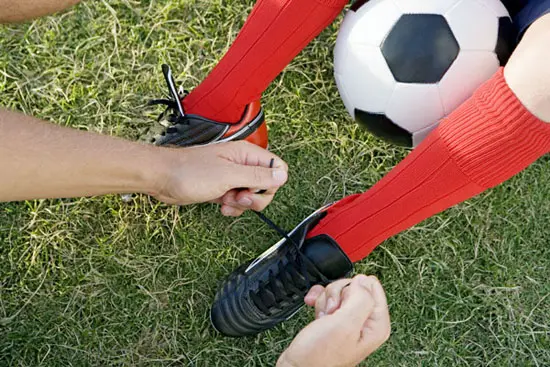by Brock Griffin
At kids’ sporting events, you’ve probably seen dads go way overboard. But what about you?
A few years back, I witnessed something that surely happens just about every day on fields and courts and diamonds around the world.
This time it was indoor soccer. I was waiting for a game to end so I could watch my daughter play, and I couldn’t help noticing a particular dad in the bleachers. It didn’t take long to figure out which girl was his daughter because of the way he cheered whenever the ball came near her.
It went on for quite a while. Then the dad just couldn’t sit still. He seemed bothered and irritated, and he kept standing up and yelling out his daughter’s name with statements like: “Be aggressive!” “You can’t wait for the play to come to you!”
Sure, it’s possible she needed that coaching. But watching the dad, you couldn’t really tell if his urgent need to yell out to his daughter at that moment was more about her play, or his competitiveness and ego.
And maybe that’s a good question we should all be asking in those situations:
Is how I’m acting right now more about me and what I want or expect, or more about what’s best for my child?
Just a few minutes later, the daughter scored a goal—a fantastic strike that curved past the goalie into the top corner of the net. As she celebrated with her teammates, the girl looked squarely at her parents in the stands with a huge smile on her face. Her dad was clapping of course, but he still seemed irritated about the way she’d been playing earlier.
Watching it all, tears almost came to my eyes because of that powerful example of how much our kids look to us for affirmation—and how we dads are so often focusing on something else.
As you know, this is nothing new in our culture. Parents in general have earned a bad reputation at their kids’ competitions and games, and we dads often lead the way.
So this is a reminder for you to have the right sense of perspective on what’s happening at your kids’ events. What is a good perspective?
It can start by remembering that no one’s getting paid millions here; believe it or not, the kids are playing for fun.
So go ahead and cheer, but remember, there’s a lot more at stake than a win or loss. You have nothing to prove except that you love and support your child—win or lose, home run or strike out.
Or … maybe don’t cheer?
Have you seen the letter to parents written by major league baseball manager Mike Matheny?
Earlier in his career, Matheny was asked to coach a boys’ team. He agreed, but first wrote a series of conditions. They might sound a bit harsh, maybe even controversial, but they’re probably worth your consideration. Here are some highlights:
I always said that the only team that I would coach would be a team of orphans…. The reason for saying this is that I have found the biggest problem with youth sports has been the parents….
This experience is all about the boys. If there is anything about it that includes you, we need to make a change of plans….
I believe that the biggest role of the parent is to be a silent source of encouragement. I think if you ask most boys what they would want their parents to do during the game; they would say “nothing.”
Once again, this is ALL about the boys. I believe that a little league parent feels that they must participate with loud cheering and “Come on, let’s go, you can do it” … which just adds more pressure to the kids. I will be putting plenty of pressure on these boys to play the game the right way with class and respect, and they will put too much pressure on themselves and each other already. You as parents need to be the silent, constant source of support….
I know that’s going to be very hard … but I am confident that this works in a negative way for their development and their enjoyment. Trust me on this. I am not saying that you cannot clap for your kids when they do well. I am saying that if you hand your child over to me to coach them, then let me do that job.
You can read the entire “Matheny Manifesto” here.
And whether you agree with him or not, please remember:
- It’s a big positive simply being at your child’s game and supporting him or her. Your presence communicates your love.
- It’s how you handle yourself once you’re there that will encourage or embarrass your son or daughter.
Dad, what’s your approach at your kids’ games and competitions? Share your thoughts and compare notes with other dads at our Facebook page.
Action Points & Questions for Reflection and Discussion:
- How did your father handle himself at your games and performances—if he was there? What do you try to do that’s similar to or different from that?
- Just ask your family members what they think about your behavior at your kids’ events.
- Then ask each of your kids how they want you to act at their events—and be open to changing your routine. (Those events are really about them, after all.)
- Make it clear to your child that he or she doesn’t have to “win” or be the best in order to earn your love and approval. Say it point blank.
- Do sports and other kids’ activities dominate your family schedule? Is it too much? Have that talk with your kids’ mom.
- According to one study of college athletes, there are 6 words they most appreciated hearing from their parents. Not constructive criticism or re-hashing all the plays in the game, but simply: “I love to watch you play.” Try it.
Brock Griffin is a staff member at NCF and co-author of the book It’s Great Being a Dad. Brock and his wife Tara have three children and live in the Kansas City area.



